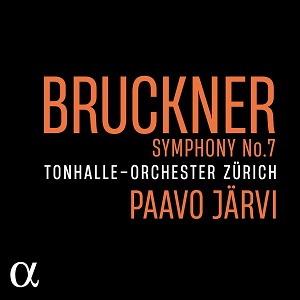
Anton Bruckner (1824-1896)
Symphony no. 7 in E major, WAB 107 (1885, ed. Nowak)
Tonhalle-Orchester Zürich/Paavo Järvi
rec. 2022, Tonhalle, Zürich
Alpha 932 [65]
Paavo Järvi belongs to the “modern school” of Bruckner interpretation: swifter and lighter; he is on record as saying, “I deliberately try to stay clear of the so-called “traditional” approach, avoiding the typical monumental, heavy and pseudo-religious-kitsch” – see Roy Westbrook’s review of his Sixth Symphony with the Frankfurt Radio Symphony Orchestra. He also recorded the Seventh with the same orchestra back in 2006 and as per here, timings are fast; the only significant difference in this latest issue with the Tonhalle is that he takes the Adagio even faster, whereas most conductors let it breathe rather more. I generally prefer the approach he eschews, but was nonetheless impressed by his recording of the Third Symphony (see my review); however, that might have been because, in my view, the Third is something of an exception among Bruckner’s symphonies in that it can take a more driven, propulsive manner and emerge intact, whereas too much haste is damaging to the later symphonies.
So does he get away with applying that approach to the Seventh here? Whatever his declared aversion to too marmoreal an approach, I find the opening of the first movement to be by turns reverential, lyrical and grand, building seamlessly to the martial climax of the third theme in octaves at 5:40. The Tonhalle orchestra does not make the biggest, juiciest sound – but this is a subtle, refined account in which Järvi brings out the contemplative beauties of the slower passages despite the paciness of his timings overall. You may hear this in the quiet section from 8:35 before the return of that third theme in jog-trot guise at 10:57 – but what is missing is sufficient torque on the introduction of the deeply tragic motif in octaves at 11:16 after the flute noodlings; it is distinctly under-powered. I concede that may be deliberate, designed not to pre-empt the impact of the climactic coda concluding the movement – which is impressive, but not as overwhelming as my favourite versions. The conclusion is lovely, too, but this movement is a bit of a sandwich with no filling.
The Adagio immediately strikes me as too polite and restrained; again, others might appreciate its subtlety but I am not swept away by it. The great F-sharp major tune is both a lament and a hymn of praise, suffused with deep, complicated emotion as Bruckner contemplated the death of his musical idol, Richard Wagner, and I do not feel that Järvi plumbs those depths here. The brisk tempo does not help; it is neither very solemn nor very slow (marking: sehr feierlich und sehr langsam) and never really takes off; most damagingly, the cymbal clash is something of an anti-climax.
The Scherzo and the finale both go well enough; the former is spritely and spirited with a gentle, soulful Trio; the latter is similarly fleet and gemütlich, bringing out its Haydnesque wit and good humour and giving the elephantine brass outbursts sufficient weight, but a recording which fails to deliver at the heavyweight points in the first two movements is not going to find itself among my favourite versions,
Ralph Moore
Help us financially by purchasing from





















